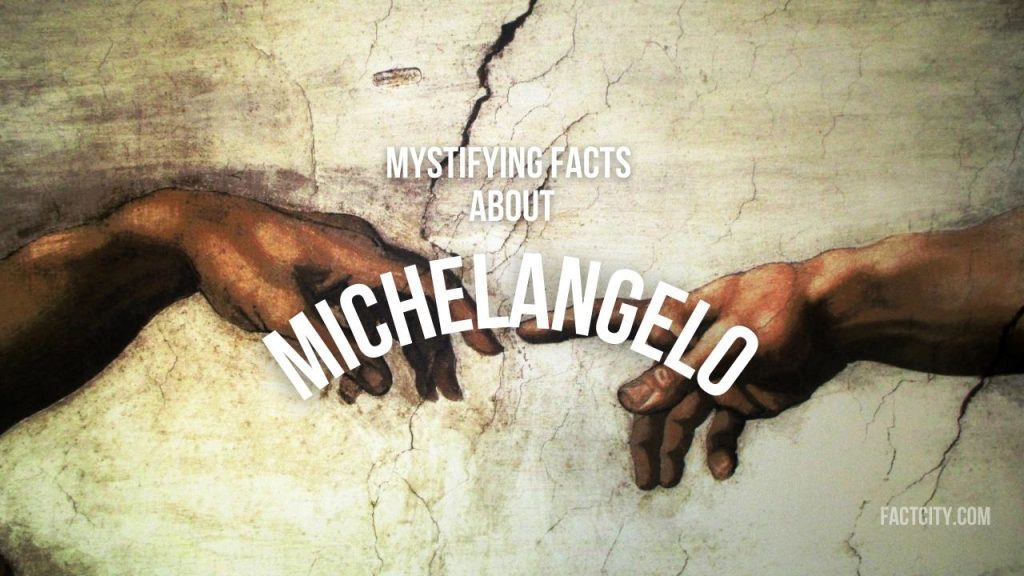Michelangelo remains one of the most influential and recognizable painters of all time. His works have transcended time, and billions have seen his works over the years, either for those lucky enough to see them in person or to have seen replicas. But how much do you actually know about one of the most famous painters of all time? Here are some fun facts about Michelangelo to surprise you.
1. He’s referred to as Michelangelo likely because his full name is so long!
Although most of us only know him as Michelangelo, his impressive full moniker was Michelangelo di Lodovico Buonarroti Simoni.
2. Michelangelo lived to the age of 89 years old.
Michelangelo was born in Caprese in Italy on March 6th, 1475. He’d pass away on February 18th, 1564, in Rome, Italy.
3. He was one of the most celebrated Renaissance Masters.
Michelangelo was a central figure in the Italian Renaissance. The Renaissance was a period known for its cultural and artistic achievements – his contemporaries during this period included Leonardo da Vinci, Sandro Botticelli, Hieronymus Bosch, and Raphael.
4. Michelangelo was best known for his paintings, but he was multi-talented, like da Vinci.
Although many of us also know Michelangelo for his artwork, he was also a sculptor, architect, and poet. His diverse talents earned him the title of “Renaissance Man.”
5. He is best known for his incredible Sistine Chapel ceiling.
Most people know Michelangelo for his work in the Sistine Chapel l in Vatican City, Rome. His legendary ceiling masterpiece features iconic frescoes depicting dramatic scenes from the Bible, including the world-famous “Creation of Adam.” It’s likely you’d recognise it even if you’ve never been!
6. Michelangelo also created a sculpture magnum opus – a rare case of an artist being known for two very different cultural landmarks.
Michelangelo’s marble statue of David is considered a masterpiece of Renaissance sculpture. It depicts the biblical hero David before his battle with Goliath – and again, it’s likely you’ve seen it despite never witnessing it up close. It’s in the Accademia Gallery in Florence, Italy.
7. The Pietà is another key example of Michelangelo’s Biblical creativity.
Michelangelo’s Pietà portrays the Virgin Mary holding the body of Jesus after the Crucifixion – and, unlike David, this statue is located in St. Peter’s Basilica in Rome. You can travel all over Italy to see his work (and the Basilica itself was a Michelangelo project)!
8. Michelangelo helped to brainstorm buildings, too.
During his life, Michelangelo also contributed to the design of several architectural projects! Some of his most famous projects included the dome of St. Peter’s Basilica and the Medici Chapel in Florence. Sadly, he passed away before the Basilica finished, but his incredible legacy lives on.
9. He famously left works unfinished.
A key thing to know about some of Michelangelo’s work is that it was purposefully left unfinished. He did so to deliberately emphasize the beauty of the raw material – at least, that’s what we’re led to believe (and hopefully he didn’t just forget about them)!
10. He spoke thoughtfully about his work.
Although we all know Michelangelo for his work with his hands, he was also a very well-spoken man. His writings contain insightful thoughts about art, life, and his creative process. One famous quote attributed to him is, “I saw the angel in the marble and carved until I set him free.”
FAQs about Michelangelo
What was Michelangelo doing when he died?
At the time when Michelangelo died, he was working on sculptures in the studio in his home. He was also watching over the construction of St. Peter’s Basilica – these were, sadly, two works that went unfinished not out of design (Michelangelo was famous for unveiling “unfinished” works to the public).
What language did Michelangelo speak?
Having been born and having lived in Italy for most of his life, it should come as no surprise that Michelangelo spoke Italian!
Why did Michelangelo destroy so many drawings before he died?
Michelangelo did indeed destroy many of his own drawings before he died. It is believed that he did so to prevent those drawings from falling into the wrong hands – an insurance policy that, apparently, served him well.
Further reading:
https://facts.uk/tag/Art
https://www.nationalgallery.org.uk/artists/michelangelo
https://www.theartstory.org/artist/michelangelo/
Do you know any fun facts about Michelangelo? Share them in the comments below!
